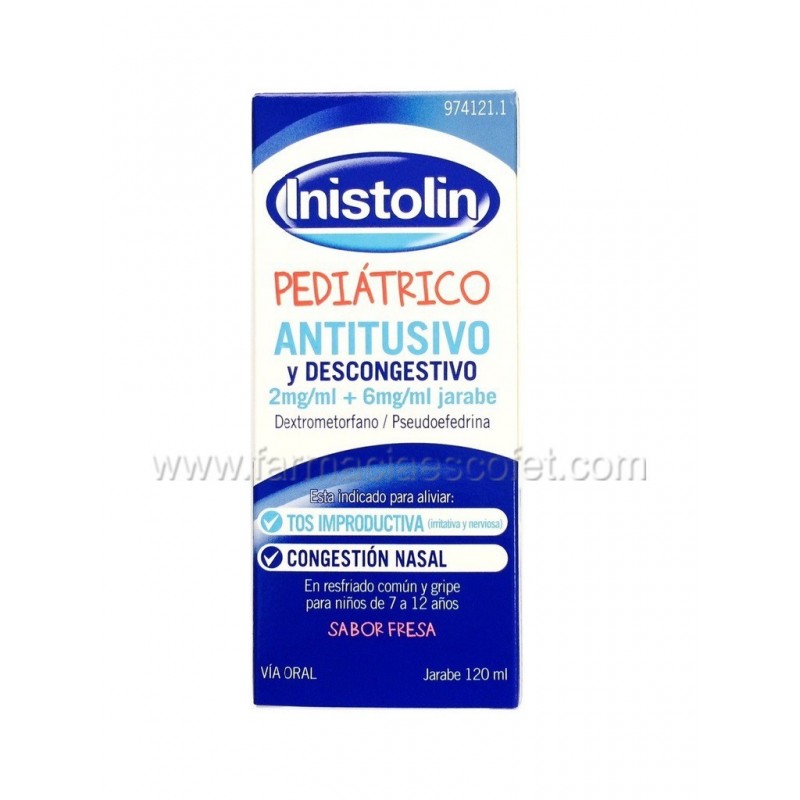



(Temporary unavailable)
Symptomatic treatment of catarrhal processes that occur with dry cough, especially that of irritative or nervous nature, and nasal congestion in adults and children over 2 years old
What Inistolin antitussive and decongestant is and what it is used for
Inistolin antitussive and decongestant is an association of pseudoephedrine and dextromethorphan.
Pseudoephedrine acts as a nasal decongestant and dextromethorphan is an antitussive.
Inistolin antitussive and decongestant is indicated in children aged 7 to 12 years to relieve unproductive forms of cough (irritative cough, nervous cough) accompanied by nasal congestion associated with the common cold and flu.
You should see your doctor if it worsens or does not improve after 5 days.
How to take Inistolin antitussive and decongestant
Always take this medicine exactly as described in this leaflet or as your doctor or pharmacist has told you. If in doubt ask your doctor or pharmacist.
The recommended dose is:
Children between 7 and 12 years old (approximate weight between 21.5 kg and 43 kg): take 5 ml every 8 hours, 3 times a day.
Children under 7 years: cannot take this medicine, it is contraindicated.
How to drink:
This medicine is taken orally.
Use the measuring spoon to measure the exact dose. Wash the spoon after each feeding.
It is recommended to drink a glass of water after each intake.
It is recommended to take this medicine with food and drink plenty of water during treatment. Do not take it with grapefruit or bitter orange juice or with alcoholic beverages.
If the medication is taken at night, it should be taken a few hours before bedtime to reduce the possibility of insomnia in patients with sleeping difficulties.
You should consult your doctor if it worsens, if symptoms persist for more than 5 days of treatment or if they are accompanied by a high fever.
If you take more Inistolin antitussive and decongestant than you should
If you take more Inistolin antitussive and decongestant than directed, you may experience the following symptoms: nausea and vomiting, involuntary muscle contractions, agitation, confusion, drowsiness, disorders of consciousness, involuntary and rapid eye movements, cardiac disorders (acceleration of heart rhythm) , coordination disorders, psychosis with visual hallucinations and hyperexcitability.
Other symptoms in case of massive overdose can be: coma, severe respiratory problems and seizures.
Contact your doctor or hospital immediately if you experience any of the above symptoms.
There have been cases of abuse with medicines containing dextromethorphan in adolescents, and serious adverse effects may appear, such as tachycardia (acceleration of the heartbeat), lethargy, hypertension or hypotension (high or low blood pressure), mydriasis (dilation of the pupil of the eye), agitation, vertigo, gastrointestinal upset, hallucinations, sputtering, nystagmus (uncontrolled and involuntary movement of the eyes), fever, tachypnea (shallow and rapid breathing), brain damage, ataxia (uncoordinated movements), seizures, respiratory depression, loss of consciousness, arrhythmias (irregular heartbeat) and death.
In case of overdose or accidental ingestion, see your doctor or call the Toxicology Information Service, (telephone 91.562.04.20), indicating the medicine and the amount ingested.
Serious side effects can occur in children in case of overdose, including neurological disturbances. Caregivers should not exceed the recommended dose.